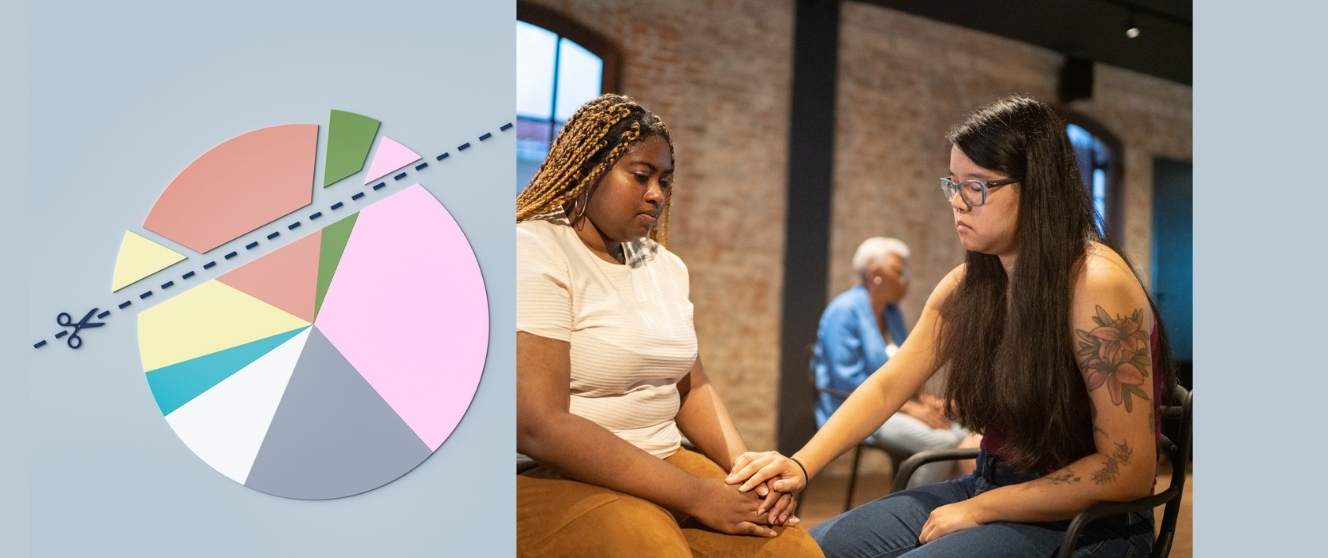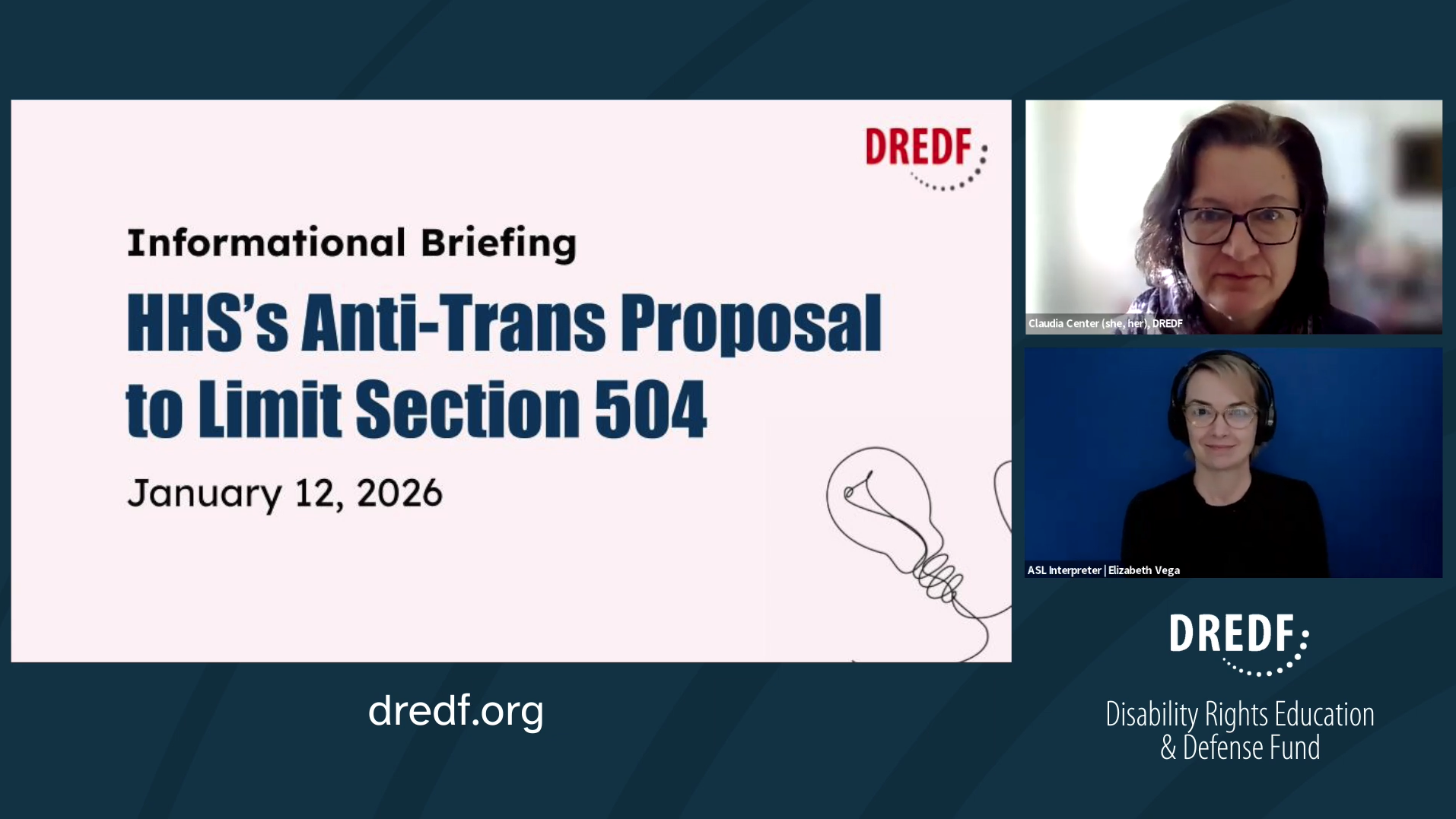
For Immediate Release:
August 27, 2020
Disability rights and older adult advocates from the Disability Rights Education & Defense Fund, Disability Rights California, Justice in Aging, and Independent Living Resource Center San Francisco filed several complaints with the California Department of Public Health (CDPH) over widespread policies and practices that put hospital patients with disabilities including older adults at increased risk in medical facilities across the state. The complaints seek the enforcement of federal and state disability discrimination laws and existing CDPH guidelines to ensure that persons whose support is essential to disabled hospital patients are granted admission to health facilities during COVID-19. In addition, the complaints demand that hospitals publish lawful visitation policies prominently on their websites, and guarantee that staff are familiar with existing legal requirements.
A California Department of Health All Facilities Letter originally published May 2, 2020, and updated August 7, 2020 states “The presence of a support person is essential to patients with physical, intellectual, and/or developmental disabilities and patients with cognitive impairments,” and that “CDPH recommends that one support person be allowed to be present with the patient when medically necessary.”
Caregivers and support persons who assist adults with disabilities must be permitted to stay-in hospitals and provide assistance when necessary to assure the safe and effective medical care of disabled patients as required by law. These individuals have in-depth knowledge of the patient’s individual needs, including communication methods, and health conditions that hospital staff can’t possibly know, especially when patients don’t relate or process information in typical ways. They typically provide basic personal care that can prevent medical complications while simultaneously relieving the significant stressors faced by hospital personnel during the pandemic. The presence of a trusted and familiar support person can make a crucial difference in effective treatment and recovery for such patients.
The complaints detail the experiences of several caregivers and supporters of adults with disabilities denied entry by hospital staff due to often confusing and inconsistent understanding of federal and state laws and CDPH guidelines, including the California SARS-CoV-2 Pandemic Crisis Care Guidelines (PDF) which were revised in June 2020. As a result, the complainants were unable to provide essential supports to ensure their loved ones received safe, effective and necessary care while hospitalized.
Case histories include:
- One 26-year old man with several developmental disabilities laid in pain after developing complications from an emergency appendectomy while his mother and regular support person was refused entry for four days to Scripps Memorial Hospital Encinitas.
- Kaiser San Leandro refused to allow the daughter and primary caregiver of a nonverbal 68-year-old patient to provide necessary overnight care to prevent aspiration and other medical complications.
Northridge Hospital Medical Center repeatedly urged the mother of a 60-year old woman with an intellectual disability to authorize a feeding tube, while refusing less invasive options such as allowing a family member or known staffer to provide mealtime support. - A 77-year old woman with dementia, aphasia, quadriplegia, and a traumatic brain injury whose daughter was initially denied entry to Cedars-Sinai Marina del Rey Hospital in San Diego.
- A 57-year old patient with psychiatric disabilities who could not speak for herself was denied necessary support for hours on a weekend. The situation was not resolved until the support person was able to track down a disability rights attorney, unnecessarily delaying much needed care.
Attorneys for the patients and supporters filed complaints against five California hospitals. The complaints can be viewed here. Complainants and attorneys are available for interviews regarding their experiences.
Legal Summary:
Hospital policies that deny entry to essential caregivers for people with disabilities violate the Americans with Disabilities Act, Section 504 of the Rehabilitation Act, Section 1557 of the Affordable Care Act, California Gov. Code § 11135 and California Civil Code § 51, et. seq. In many cases, hospitals that do have policies aligned with the law often fail to train frontline staff in what the law requires. In either case, support persons and families of people with disabilities and older adults are compelled to advocate for themselves to force the hospitals to follow the law, instead of being able to focus on their loved ones’ needs.
For more information, or to arrange for interviews with complainants and attorneys, please contact:
Lawrence Carter-Long, Director of Communications, Disability Rights Education & Defense Fund
510-644-2555 ext 5256, LCarterLong@dredf.org
Melody Pomraning, Communications Director, Disability Rights California
916-504-5938, Melody.Pomraning@disabilityrightsca.org
Denny Chan, Senior Staff Attorney, Justice in Aging
213-375-3559, dchan@justiceinaging.org
Brandie Sendziak, Supervising Attorney, Independent Living Resource Center San Francisco
628-231-2287, brandie@ilrcsf.org
# # #
Founded in 1979, the Disability Rights Education and Defense Fund (DREDF) is a leading national civil rights law and policy center directed by individuals with disabilities and parents who have children with disabilities. DREDF works to advance the civil and human rights of people with disabilities through legal advocacy, training, education, and public policy and legislative development.
Disability Rights California (DRC) is the agency designated under federal law to protect and advocate for the rights of Californians with disabilities. The mission of DRC is to advance the rights, dignity, equal opportunities, and choices for all people with disabilities.
Justice in Aging is a national non-profit legal advocacy organization that fights senior poverty through law. Formerly the National Senior Citizens Law Center, since 1972 we’ve worked for access to affordable health care and economic security for older adults with limited resources, focusing especially on populations that have traditionally lacked legal protection such as women, people of color, LGBT individuals, and people with limited English proficiency. Through targeted advocacy, litigation, and the trainings and resources we provide to local advocates, we ensure access to the social safety net programs that poor seniors depend on, including Medicare, Medicaid, Social Security, and Supplemental Security Income (SSI).
Independent Living Resource Center San Francisco (ILRCSF) is a disability rights advocacy and support organization. We work to empower individuals and community, so that all people with disabilities have as full, productive and independent lives as they so choose.

